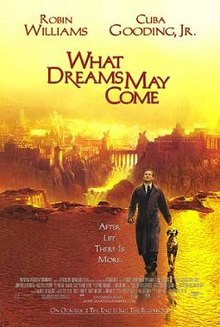What Dreams May Come - Life After Death

This is a really monumental movie dressed up as entertainment. In subject matter, it scales the Earth, heaven and hell, the heights of human love, the depths of depression, and our lives while alive on earth and after.
Life after death can be heaven or hell depending on the thought habits one cultivates while alive on Earth. Positive or negative; strong or weak, optimistic or pessimistic, kind or angry, full of love or full of bitterness. The main character (Robin Williams) loved art and beauty while alive and consequently his heaven was like living inside of his favorite painting.
He dies in a car crash and is met by an old friend (Cuba Gooding Jr.) almost immediately thereafter who becomes his spirit guide. His guide gently leads him to understand and accept that he has died, yet still exists and is just as conscious as he was while "alive". Part of the spirit guide's initial teaching is that this new environment in which the main character finds himself is thought responsive; and that consequently his thoughts create reality. This is a fundamental premise we students of the subtle world know is true.
I first watched this movie 15 years ago, before I knew anything about the subtle world other than that I had very vivid and interesting dreams. At that time it was one of my favorite movies because of how artful and beautiful it was (it won an Academy Award for Visual Effects) and how genuine and sincere it depicted family relationships. Now I'm blown away by how much the content of this movie aligns with all the things I've learned about life, death, and the Subtle World over the last few years.

